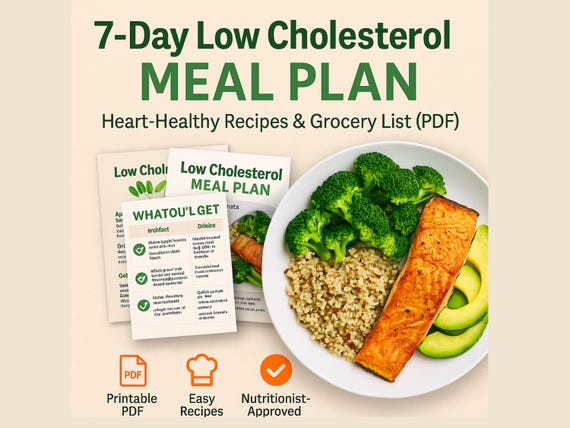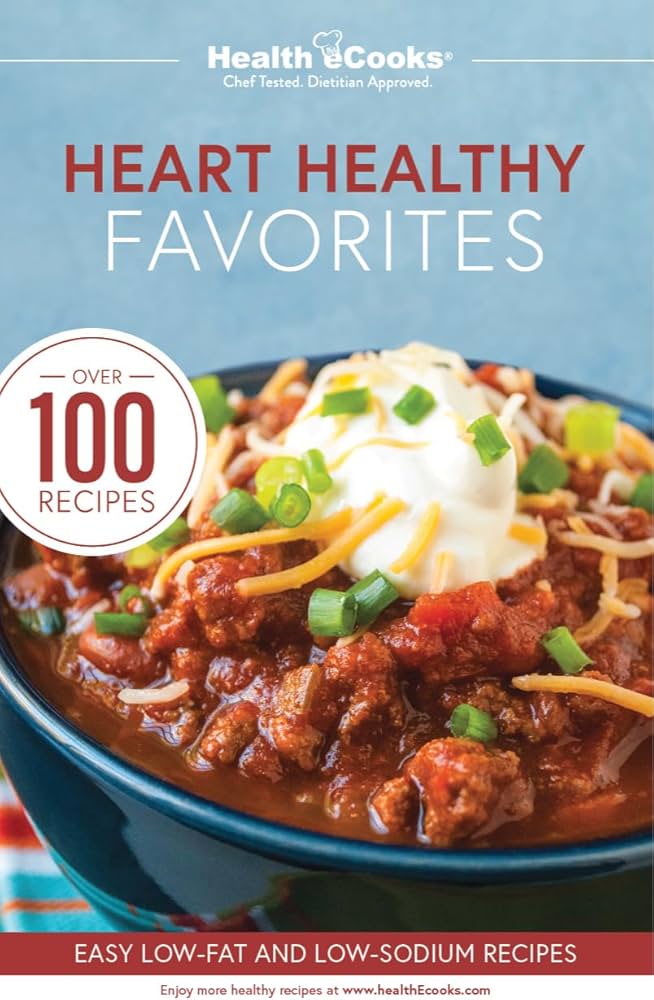Your heart works hard every single day to keep you going. Giving it the right fuel can make all the difference in how you feel now—and years from now. Heart-Healthy Recipes are the best way to make it easy.
Imagine enjoying meals that not only taste great but also support your heart’s health. This article brings you heart-healthy recipes approved by nutritionists, designed to protect your heart without sacrificing flavor. Keep reading to discover simple, delicious dishes that can help you take control of your heart health starting today.
Benefits Of Heart-healthy Eating
Eating heart-healthy foods helps keep your heart strong and working well. It lowers the risk of heart disease and other heart problems. Good nutrition also improves your energy and mood.
Choosing the right foods can help control blood pressure and cholesterol. It supports healthy blood flow and reduces inflammation. Small changes in your diet can make a big difference over time.
Impact On Cardiovascular Health
Heart-healthy eating reduces the chance of heart attacks and strokes. It helps keep arteries clear by lowering bad cholesterol. Healthy foods also reduce blood pressure and prevent blood clots.
Eating more fruits, vegetables, and whole grains strengthens your heart. It improves circulation and makes your heart work more efficiently. Over time, this lowers the risk of heart failure and other heart problems.
Key Nutrients For Heart Care
Omega-3 fatty acids protect the heart and reduce inflammation. They are found in fish, flaxseeds, and walnuts. Fiber helps lower cholesterol and is found in fruits, vegetables, and whole grains.
Potassium balances blood pressure and supports heart function. Foods like bananas, potatoes, and spinach are good sources. Antioxidants protect cells from damage and are abundant in berries and nuts.

Credit: www.etsy.com
Essential Ingredients For Heart Health
Eating foods that support heart health helps keep your heart strong. Choosing the right ingredients is key. These foods can lower bad cholesterol and reduce heart disease risks. Nutritionists recommend certain ingredients for a heart-healthy diet. They provide important nutrients and promote good circulation.
Whole Grains And Fiber
Whole grains are rich in fiber. Fiber helps lower cholesterol and controls blood sugar levels. Brown rice, oats, and whole wheat are great choices. Eating whole grains improves digestion and keeps you full longer. Fiber also helps remove harmful fats from the body.
Healthy Fats And Oils
Healthy fats protect your heart and reduce inflammation. Use olive oil, avocado, and nuts in your meals. These fats help raise good cholesterol and lower bad cholesterol. Avoid trans fats and limit saturated fats. Healthy fats support brain health and provide energy.
Fruits And Vegetables
Fruits and vegetables are packed with vitamins and minerals. They are low in calories and high in antioxidants. These nutrients help fight damage to blood vessels. Choose colorful fruits and vegetables for a variety of nutrients. They also add fiber and improve blood pressure.
Lean Proteins
Lean proteins help build and repair body tissues. Skinless chicken, fish, beans, and legumes are good options. Fish like salmon contains omega-3 fatty acids, which benefit the heart. Lean proteins provide energy without excess fat. They support muscle health and keep you satisfied.
Related Products
Breakfast Ideas For A Healthy Heart
Breakfast fuels your body and supports heart health. Choosing the right foods can lower cholesterol and blood pressure. These recipes include ingredients that help keep your heart strong.
Start your day with meals rich in fiber, healthy fats, and antioxidants. These options are easy to make and taste great.
Oatmeal With Berries And Nuts
Oatmeal is full of fiber that helps reduce bad cholesterol. Berries add antioxidants that protect your heart cells. Nuts bring healthy fats and protein to keep you full longer.
Use rolled oats and cook with water or low-fat milk. Top with fresh berries like blueberries or strawberries. Sprinkle a handful of almonds or walnuts for crunch and nutrients.
Avocado Toast Variations
Avocado contains healthy monounsaturated fats that support heart health. Spread mashed avocado on whole grain toast for a nutritious base. Add toppings like tomato slices, spinach, or a boiled egg.
This meal offers fiber and vitamins that improve blood flow. It also keeps blood sugar steady through the morning.
Smoothie Bowls Packed With Nutrients
Smoothie bowls blend fruits, vegetables, and seeds for a nutrient boost. Use spinach, kale, or berries as your base. Add chia seeds or flaxseeds for omega-3 fats.
Top with sliced fruits and nuts for texture. These bowls are colorful, tasty, and heart-friendly.
Lunch Recipes To Boost Heart Health
Eating lunch that supports heart health helps keep your body strong. Nutritious meals can lower bad cholesterol and improve blood flow. These recipes use simple ingredients full of vitamins and fiber. They help protect your heart and keep you full and energized for hours.
Quinoa And Veggie Salad
This salad mixes cooked quinoa with colorful vegetables. Quinoa is rich in protein and fiber. Chopped cucumbers, tomatoes, and bell peppers add crunch and vitamins. A light lemon dressing brightens the taste without extra fat. This dish is easy to prepare and perfect for a quick lunch.
Grilled Chicken And Spinach Wraps
Grilled chicken provides lean protein that supports muscle and heart health. Fresh spinach adds iron and antioxidants. Use a whole wheat wrap for extra fiber. Add a touch of avocado for healthy fats. This wrap is tasty, portable, and keeps your heart happy.
Lentil And Vegetable Soup
Lentils are a great source of protein and fiber. Combined with carrots, celery, and tomatoes, this soup is filling and heart-friendly. Simmering the ingredients brings out rich flavors without salt or fat. Enjoy this warm soup to nourish your heart and soothe your body.
Dinner Options That Support Heart Wellness
Eating a heart-healthy dinner can protect your heart and improve your health. Choosing meals rich in nutrients and low in unhealthy fats helps keep your heart strong. These dinner ideas are tasty and good for your heart.
Each recipe uses simple ingredients that support heart wellness. They are easy to prepare and perfect for any night of the week.
Baked Salmon With Asparagus
Salmon is full of omega-3 fatty acids that reduce inflammation. Baking salmon keeps it moist without adding unhealthy fats. Asparagus adds fiber and vitamins to the meal. Together, they make a balanced, heart-friendly dinner.
Season the salmon with herbs and lemon for extra flavor. Roast asparagus until tender but still crisp. This dish is quick to prepare and satisfying.
Stir-fried Tofu With Broccoli
Tofu is a great plant-based protein that supports heart health. Broccoli contains antioxidants and fiber to lower cholesterol. Stir-frying keeps the vegetables fresh and colorful. Use a small amount of olive oil for healthy fat.
Add garlic and ginger for taste without salt. Serve with brown rice for a complete meal. This dish is perfect for a light and nourishing dinner.
Whole Wheat Pasta With Tomato Sauce
Whole wheat pasta provides more fiber than regular pasta. Tomato sauce is rich in lycopene, a powerful antioxidant. Choose a sauce made with fresh tomatoes and herbs. Avoid heavy cream or cheese to keep it heart-friendly.
Add vegetables like spinach or bell peppers to boost nutrients. Cook the pasta al dente to keep its texture. This meal is simple, filling, and supports heart health.

Credit: www.amazon.com
Snacks And Sides For Heart Care
Snacks and sides play a big role in heart health. Choosing the right ones can help lower bad cholesterol and keep blood pressure in check. These small bites provide nutrients that support heart function and reduce inflammation.
Simple, tasty options make it easy to care for your heart every day. Here are some nutritionist-approved snacks and sides that fit perfectly in a heart-healthy diet.
Mixed Nuts And Seeds
Mixed nuts and seeds offer healthy fats and fiber. They contain omega-3 fatty acids that protect the heart. Almonds, walnuts, and flaxseeds are top choices. A small handful is enough to boost heart health. Avoid salted or sugary varieties to keep them heart-friendly.
Hummus With Fresh Veggies
Hummus made from chickpeas is rich in protein and fiber. Pair it with crunchy fresh veggies like carrots and cucumbers. This snack is low in calories and full of vitamins. It helps keep blood sugar steady and reduces heart disease risk.
Fruit And Yogurt Parfaits
Fruit and yogurt parfaits combine antioxidants and probiotics. Use low-fat or Greek yogurt for added protein. Fresh berries add natural sweetness and heart-healthy nutrients. Layer fruits and yogurt for a colorful, tasty snack that supports heart wellness.
Tips For Cooking Heart-healthy Meals
Cooking heart-healthy meals can be simple and tasty. Small changes in how you prepare food help protect your heart. Follow these tips to make meals that support heart health without losing flavor.
Reducing Sodium Intake
Too much salt raises blood pressure. Use less salt in your recipes. Choose fresh or frozen vegetables over canned ones. Read labels to find low-sodium products. Rinse canned foods to remove extra salt. Use salt substitutes carefully, if at all.
Using Herbs And Spices
Herbs and spices add flavor without salt or fat. Try basil, oregano, rosemary, or thyme. Garlic and ginger add zest and health benefits. Fresh herbs taste best but dried ones work well. Mix different spices for rich, exciting tastes.
Healthy Cooking Methods
Choose cooking methods that keep nutrients and reduce fat. Bake, steam, grill, or sauté with little oil. Avoid frying or use healthy oils like olive oil. Cook vegetables lightly to keep vitamins. Use non-stick pans to use less fat.
Meal Planning For A Heart-healthy Lifestyle
Meal planning plays a key role in a heart-healthy lifestyle. It helps control ingredients and portion sizes. Planning meals ahead reduces stress and avoids unhealthy choices. A clear plan supports balanced nutrition and better heart health. Simple steps can make meal planning effective and enjoyable.
Batch Cooking And Prep Ideas
Batch cooking saves time and ensures healthy meals are ready. Prepare large portions of heart-friendly dishes like vegetable soups or grilled chicken. Store meals in containers for easy access during the week. Chop vegetables and portion nuts ahead to simplify cooking. This approach keeps meals fresh and reduces the urge for fast food.
Balancing Macronutrients
Balanced macronutrients support heart health and energy levels. Include lean proteins, whole grains, and healthy fats in meals. Proteins help repair tissues and maintain muscle mass. Whole grains provide fiber that lowers cholesterol. Healthy fats from nuts, seeds, and fish protect the heart. Equal focus on each nutrient keeps meals satisfying and nutritious.
Incorporating Variety
Variety makes meals interesting and nutrient-rich. Use different vegetables, fruits, and proteins throughout the week. Change cooking methods like baking, steaming, or grilling for new flavors. Try herbs and spices to add taste without salt. Variety helps meet nutrient needs and prevents boredom with food.

Credit: yourlatinanutritionist.com
Frequently Asked Questions
What Ingredients Make Recipes Heart-healthy?
Heart-healthy recipes often include whole grains, lean proteins, healthy fats, fruits, and vegetables. These ingredients help reduce cholesterol and improve heart function.
How Do Nutritionists Choose Heart-healthy Recipes?
Nutritionists select recipes low in saturated fats, sodium, and added sugars. They focus on nutrient-rich foods that support cardiovascular health.
Can Heart-healthy Meals Be Tasty And Easy To Make?
Yes, heart-healthy meals can be flavorful and simple. Using fresh herbs, spices, and diverse ingredients enhances taste without unhealthy additives.
How Often Should I Eat Heart-healthy Recipes?
Eating heart-healthy recipes daily supports long-term heart health. Consistency in balanced meals helps maintain cholesterol and blood pressure levels.
Conclusion
Eating heart-healthy meals helps protect your heart every day. Choose recipes with fresh vegetables, whole grains, and lean proteins. Small changes in your diet can make a big difference. These recipes are tasty and easy to prepare. Enjoy meals that support your health and satisfy your taste buds.
Keep your heart strong by cooking smart and eating well. Simple steps lead to a healthier life. Try these nutritionist-approved dishes and feel the benefits. Your heart will thank you.







